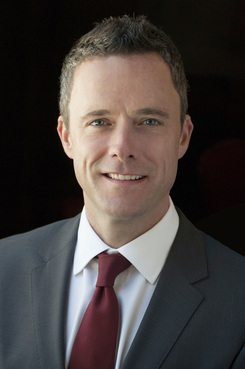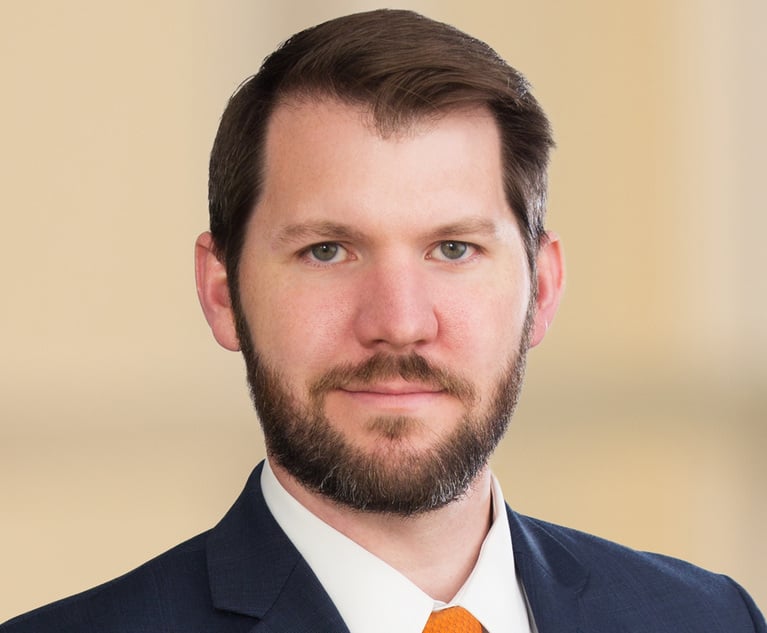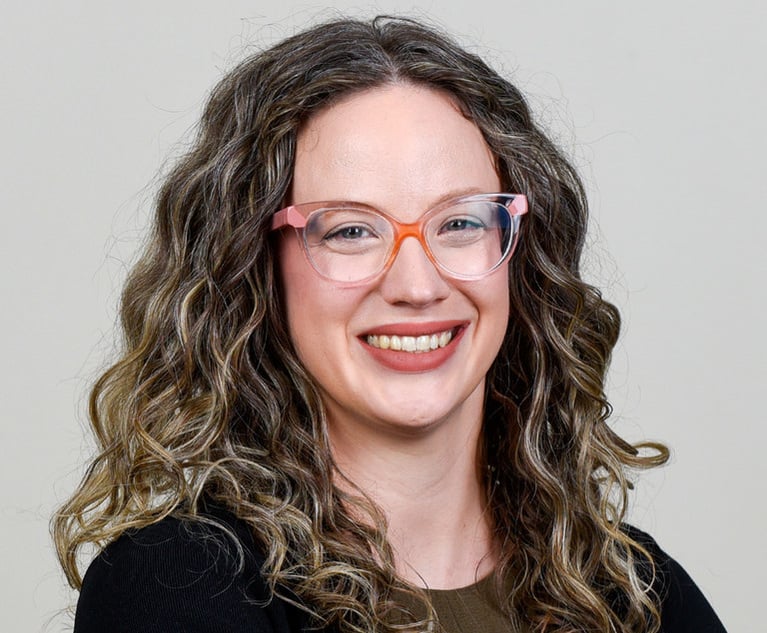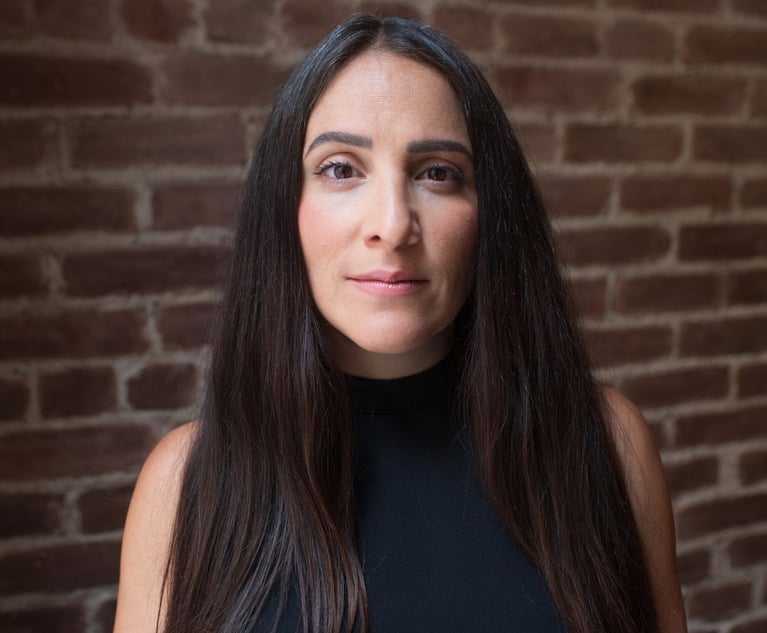Q&A: Why Firms Need New Norms on Substance Abuse, Mental Health
Alcohol and drug counselor Patrick Krill says a new ABA pledge campaign to increase lawyer well-being is "not just words."
September 11, 2018 at 03:02 PM
6 minute read
The original version of this story was published on New York Law Journal
 Credit: Nicholas Monu/iStockphoto.com
Credit: Nicholas Monu/iStockphoto.com
The American Bar Association this week launched a pledge campaign for legal employers to address the profession's high rates of substance abuse and mental health problems. The campaign, organized by the ABA Working Group to Advance Well-Being in the Legal Profession, asks firms to adopt a seven-point framework that includes steps such as breaking from the expectation that all events include alcohol.
Alcohol and drug counselor Patrick Krill, an attorney who developed the framework and a member of the working group, answers questions about how some firms got involved at the outset, how the campaign will seek to hold signatory firms accountable and the challenges ahead.
 Patrick Krill.
Patrick Krill.Why are there 13 law firms from the launch signing the pledge? Did the working group initially approach all Am Law 200 or NLJ 500 firms?
No. Initially, we approached firms that members of the working group had relationships with or otherwise we knew had an interest in lawyer well-being. Some firms approached us. This is a core group of supporters who were, enthusiastically, all committed to making this campaign a success. From this point forward, we will be more broadly recruiting from the law firm community, large and small firms, and from all legal employers, including corporate legal departments and government agencies that employ attorneys. It's a framework that could be applicable in any legal employment context.
Our theory, once we have a critical mass behind this initiative, it really will take on a life of its own and it will become the norm—that the majority of legal employers will sign the pledge, and not being part of this will become the exception, rather than the rule.
Is there a deadline to participate?
They are free to join this campaign at any time, but if they want to be part of what we are designating the inaugural class of employers who are supporting this, they would need to join by Jan. 1, 2019. If they want to demonstrate leadership and commitment to these issues, stepping forward now and getting behind these issues is a benefit.
Have you received any pushback or reluctance from firms to sign on?
We haven't. We have heard questions, wanting to know more, to explain the campaign and the pledge in more detail. I would anticipate we may experience reluctance moving forward but today we've only had discussions with firms that would be willing to get behind this initiative. Some firms are quite cautious in their willingness to publicly take a position on these issues. I believe it's because of the stigma that is attached to addiction and mental health issues. Firms are reluctant to acknowledge that some of their lawyers may struggle from time to time.
Some large firms may already provide these resources to their employees and partners. In seeking this pledge, is there some recognition that their efforts aren't working?
Many firms probably are not doing a lot in relation to these issues. While firms like Reed Smith or Latham & Watkins or other firms may be able to point to an existing well-being program, I believe many more firms probably do not have an existing well-being initiative that you could point to. More generally, firms have a ways to go.
Is there a concern that attorneys may not actually utilize the programs in the pledge, and that it's simply used for marketing?
I would hope not. I can understand that sort of that thought and why that may be a concern. But the purpose of a pledge campaign like this, where we are trying to build a large community of legal employers who are all making a commitment to do certain things to improve lawyer being, is really to make it more substantive. So it's not just words, not just an image-based program, to really put some meat on the bones and to make it a concerted initiative within any given firm.
The hope is that something like this really will normalize these types of programs and to make it part of the fabric and culture in the profession.
Is there any way to hold firms accountable to the pledge?
That was one of the concerns to get this launched, that it would not be a pledge in name only. A survey will be circulated to firms one year after they sign on, asking them to identify the steps they've taken to fulfill the framework. And if firms aren't making progress and if they are not taking concrete steps to fulfill the framework, their names will be taken off the list of signatory firms.
This is not intended to be a shaming exercise, but the point of making the list is to ensure the integrity of the pledge commitment, to ensure that firms maintain this commitment, they are willing to take certain steps. We won't be publicly announcing that firms are getting off the list, but the list [on the ABA's website] will be kept current.
Firms shouldn't be deterred from signing this pledge if they haven't currently done anything around these seven points. They have a full year to demonstrate they're making progress.
What are the challenges?
Some of the challenges are that firms may be fearful of negative PR or what type of questions they may receive about why they may sign on to this.
Some firms are simply not at a point at which they have identified well-being as a priority. In some sense, we have our work cut out for us, but at the same time, the group is very encouraged by the strong foundation of firms we have from the outset. They're willing to publicly and visibly get behind this.
This is a campaign that is targeted at reducing substance abuse and mental health problems among attorneys. If you zoom out, this is about giving legal employers a framework to strengthen and protect their most important asset, which is their people.
This interview was condensed and edited for style and clarity. Starting Monday, Krill will launch a series in his Well Counseled column on Law.com centered on the results of a recent ALM Intelligence survey of Am Law 200 firms. The survey asked law firm leaders about their attitudes on substance abuse and mental health challenges in the legal profession and what they're doing about the problem.
This content has been archived. It is available through our partners, LexisNexis® and Bloomberg Law.
To view this content, please continue to their sites.
Not a Lexis Subscriber?
Subscribe Now
Not a Bloomberg Law Subscriber?
Subscribe Now
NOT FOR REPRINT
© 2025 ALM Global, LLC, All Rights Reserved. Request academic re-use from www.copyright.com. All other uses, submit a request to [email protected]. For more information visit Asset & Logo Licensing.
You Might Like
View All
How I Made Office Managing Partner: 'Don’t Be an Opportunity Killer,' Says Thomas Haskins of Barnes & Thornburg

Retention, Development and 'Empowering Teams': This Am Law 200 Firm's Newest Practice Leader Says Objectives Haven't Changed
6 minute read
How I Made Partner: 'Take Every Opportunity to Get Involved in the Business Side of the Firm,' Says Alyssa Domzal of Ballard Spahr

How I Made Practice Group Chair: 'Cultivating a Culture of Mutual Trust Is Essential,' Says Gina Piazza of Tarter Krinsky & Drogin
Trending Stories
- 1Parties’ Reservation of Rights Defeats Attempt to Enforce Settlement in Principle
- 2ACC CLO Survey Waves Warning Flags for Boards
- 3States Accuse Trump of Thwarting Court's Funding Restoration Order
- 4Microsoft Becomes Latest Tech Company to Face Claims of Stealing Marketing Commissions From Influencers
- 5Coral Gables Attorney Busted for Stalking Lawyer
Who Got The Work
J. Brugh Lower of Gibbons has entered an appearance for industrial equipment supplier Devco Corporation in a pending trademark infringement lawsuit. The suit, accusing the defendant of selling knock-off Graco products, was filed Dec. 18 in New Jersey District Court by Rivkin Radler on behalf of Graco Inc. and Graco Minnesota. The case, assigned to U.S. District Judge Zahid N. Quraishi, is 3:24-cv-11294, Graco Inc. et al v. Devco Corporation.
Who Got The Work
Rebecca Maller-Stein and Kent A. Yalowitz of Arnold & Porter Kaye Scholer have entered their appearances for Hanaco Venture Capital and its executives, Lior Prosor and David Frankel, in a pending securities lawsuit. The action, filed on Dec. 24 in New York Southern District Court by Zell, Aron & Co. on behalf of Goldeneye Advisors, accuses the defendants of negligently and fraudulently managing the plaintiff's $1 million investment. The case, assigned to U.S. District Judge Vernon S. Broderick, is 1:24-cv-09918, Goldeneye Advisors, LLC v. Hanaco Venture Capital, Ltd. et al.
Who Got The Work
Attorneys from A&O Shearman has stepped in as defense counsel for Toronto-Dominion Bank and other defendants in a pending securities class action. The suit, filed Dec. 11 in New York Southern District Court by Bleichmar Fonti & Auld, accuses the defendants of concealing the bank's 'pervasive' deficiencies in regards to its compliance with the Bank Secrecy Act and the quality of its anti-money laundering controls. The case, assigned to U.S. District Judge Arun Subramanian, is 1:24-cv-09445, Gonzalez v. The Toronto-Dominion Bank et al.
Who Got The Work
Crown Castle International, a Pennsylvania company providing shared communications infrastructure, has turned to Luke D. Wolf of Gordon Rees Scully Mansukhani to fend off a pending breach-of-contract lawsuit. The court action, filed Nov. 25 in Michigan Eastern District Court by Hooper Hathaway PC on behalf of The Town Residences LLC, accuses Crown Castle of failing to transfer approximately $30,000 in utility payments from T-Mobile in breach of a roof-top lease and assignment agreement. The case, assigned to U.S. District Judge Susan K. Declercq, is 2:24-cv-13131, The Town Residences LLC v. T-Mobile US, Inc. et al.
Who Got The Work
Wilfred P. Coronato and Daniel M. Schwartz of McCarter & English have stepped in as defense counsel to Electrolux Home Products Inc. in a pending product liability lawsuit. The court action, filed Nov. 26 in New York Eastern District Court by Poulos Lopiccolo PC and Nagel Rice LLP on behalf of David Stern, alleges that the defendant's refrigerators’ drawers and shelving repeatedly break and fall apart within months after purchase. The case, assigned to U.S. District Judge Joan M. Azrack, is 2:24-cv-08204, Stern v. Electrolux Home Products, Inc.
Featured Firms
Law Offices of Gary Martin Hays & Associates, P.C.
(470) 294-1674
Law Offices of Mark E. Salomone
(857) 444-6468
Smith & Hassler
(713) 739-1250








